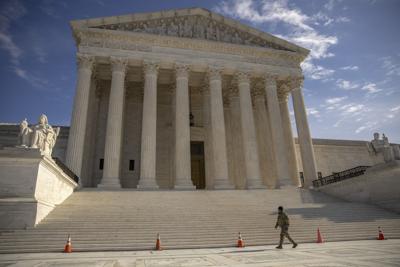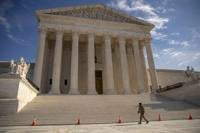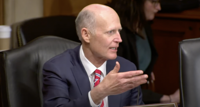(The Center Square) – Supreme Court Justices asked some tough questions about the federal bribery statute during oral arguments Monday in a case that could have broad implications for what bribery means and how it is prosecuted across the nation.
At issue is whether a section of the federal bribery statute criminalizes gratuities – payments in recognition of actions a state or local official has already taken or committed to take, without any quid pro quo agreement to take such actions.
Justices repeatedly asked Colleen Sinzdak, assistant to the Solicitor General, how the government's position could stand.
Justice Amy Coney Barrett at one point told Sinzdak: "I'm increasingly worried about the government’s position."
Justice Brett Kavanaugh asked Sinzdak how officials know if a reward crosses the line into illegal conduct.
"What is innocuous and what is not?" he asked. "And just as important, how is the official supposed to know ahead of time?"
The justices brought forward a raft of hypothetical situations, including a dinner at the Cheesecake Factory, a meal at Chipotle, a gift of pornography and an apple left on a teacher's desk as they tried to tease out answers to the question before the court. The justices also touched on the long history of corruption in Chicago and Illinois. Even the late Chicago mob boss Al Capone was mentioned.
Lisa Blatt, counsel for petitioner James Snyder, a former Indiana mayor convicted twice of corruption, said the broad federal bribery statute subjects 19 million state, local and tribal officials along with 14 million Medicare-funded health care workers to the federal bribery statute.
"Congress did not plausibly subject all of these people to 10 years in prison just for accepting gifts," Blatt argued. "Especially when federal officials face only two years for accepting gifts" under another federal statute.
Some union groups and the National Association of Criminal Defense Lawyers filed briefs in the case.
"This case presents a criminal statute that has been stretched beyond its limits," the National Association of Criminal Defense Lawyers wrote in its brief. "The government reads section 666 to criminalize not only quid pro quo bribes, but also the payment of any after-the-fact gratuity, if that payment was made in recognition of actions already taken – even if the official did not agree to act in exchange for the payment. That reading is wrong as a textual and structural matter. And it has serious and far-reaching consequences for state and local government employees and their constituents."
Justice Clarence Thomas was absent from the court Monday without explanation.
The U.S. Supreme Court has taken up the case of former Portage, Indiana, mayor James Snyder this session and its decision could have significant implications for public officials across the country along with prosecutors, unions, criminal defense attorneys and taxpayers.
Snyder took office in 2012 at a time when he was strapped for cash. His business, First Financial Trust Mortgage, owed nearly $100,000 in payroll taxes as of 2009. And he was behind on his personal taxes. The IRS had taken money from his personal bank accounts in both 2010 and 2011.
Prosecutors contended that when it came time for the city to buy garbage trucks, Snyder rigged the bidding process to make sure the contracts went to Great Lakes Peterbilt, a trucking company owned by brothers Robert and Steve Buha. Great Lakes Peterbilt got two contracts with a total value of $1.125 million. Three weeks after the second contract, Great Lakes Peterbilt sent a $13,000 check to a defunct company that Snyder owned. Snyder then moved most of the money to his personal account. When the FBI asked about the $13,000, Snyder said it was for consulting services he provided to Great Lakes Peterbilt. Snyder was eventually convicted of bribery twice in two trials.
The case could have implications for two ongoing corruption cases in Illinois along with others across the country that rely on the federal program bribery statute.
In Illinois, a federal judge put the sentencing of four former utility executives and lobbyists on hold until after the Supreme Court rules in the Snyder case.
In May 2023, a jury convicted former state lawmaker and lobbyist Michael McClain, former ComEd CEO Anne Pramaggiore, former ComEd lobbyist John Hooker and former contract lobbyist Jay Doherty. The case involved a conspiracy to bribe former Illinois House Speaker Michael Madigan with $1.3 million in no-show jobs, contracts and payments to associates in exchange for support with legislation that would benefit the utility's bottom line.
Another judge moved Madigan's upcoming corruption trial to October, after the Supreme Court is expected to issue a decision in the Snyder case in May, June or July.
Madigan served in the Illinois House from 1971 to 2021. He served as speaker of the Illinois House from 1983 to 1995 and again from 1997 to 2021. That made him one of the state's most powerful politicians, especially in combination with his role as head of the Democratic party in the state. He faces 23 counts of racketeering, bribery and official misconduct as part of a federal indictment. Madigan said he was just doing his job as a politician. He has pleaded not guilty.
Madigan was initially charged along with McClain in March 2022 with 22 counts of racketeering and bribery for his alleged improper dealings with the state's largest utility, ComEd. Prosecutors further alleged that he used his political power to unlawfully steer business to his private law firm, Madigan & Getzendanner. In October 2022, prosecutors filed a superseding indictment that charged Madigan and McClain with conspiracy related to an alleged corruption scheme involving AT&T Illinois.











